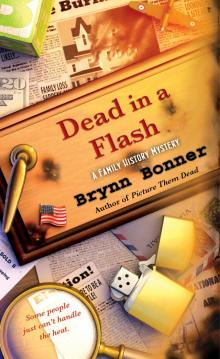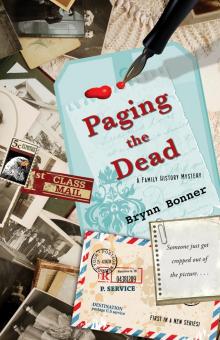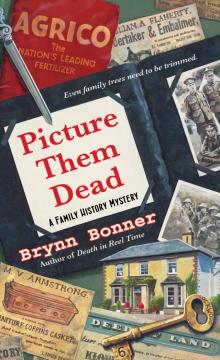- Home
- Brynn Bonner
Dead in a Flash
Dead in a Flash Read online
Praise for Brynn Bonner’s delightful cozy mystery series
PICTURE THEM DEAD
“Brynn Bonner ingeniously tosses in clues to keep guesses coming, yet no guarantees build anticipation. Picture Them Dead is grippingly mysterious.”
—Single Titles
“A new treat from Bonner’s Family History Mystery series, this one is a whole lot of fun from start to finish.”
—Suspense Magazine
“Bonner does an excellent job of including backstory and character descriptions . . . everything is seamless so you are at once placed right in the middle of the story. Excellent storytelling skills.”
—Night Owl Reviews
“Brynn Bonner’s characters teem with family flavor.”
—Killer Nashville
DEATH IN REEL TIME
“What seems like a giveaway leads to a surprising climax.”
—Kirkus Reviews
“Several very inconspicuous details are scattered throughout the story, and Brynn Bonner ingeniously brings all the facts together for a shocking conclusion. . . . An inventively cunning mystery.”
—Single Titles
PAGING THE DEAD
Selected as Library Journal’s Mystery Debut of the Month
“Bonner successfully combines an intriguing cast with the promise of an unfolding romance and a spritz of the paranormal in her winning cozy debut.”
—Library Journal (starred review)
“Bonner adds a nice mix of genealogical scrapbooking info and . . . romantic entanglements.”
—Publishers Weekly
“The past and present intriguingly collide. . . . There are plenty of suspects plus loads of clues . . . and some clever humor adds to the entertainment.”
—Single Titles
“Engaging and touching. . . . Goes beneath the surface of family trees, and gets to the roots of relationships.”
—Mystery Scene
Thank you for downloading this Pocket Books eBook.
* * *
Join our mailing list and get updates on new releases, deals, bonus content and other great books from Pocket Books and Simon & Schuster.
CLICK HERE TO SIGN UP
or visit us online to sign up at
eBookNews.SimonandSchuster.com
For Katian, Stephanie, May, Bobby, and Kevin. You amaze me; each of you and all of you.
acknowledgments
I am thankful for insights, suggestions, and encouragement from the Weymouth Seven: Sarah Shaber, Margaret Maron, Alexandra Sokoloff, Kathy Trocheck (Mary Kay Andrews), Diane Chamberlain, and Katy Munger. And, as always, for help and support from my family.
one
“NOW YOU’VE GONE AND DONE it!” my business partner, Esme Sabatier, said, lifting a cucumber slice off one eye to glare at me. “You know better than to say such a thing.”
“All I said was I can’t believe how smoothly this job has gone,” I said. I’d meant to put more punch into the protest but my voice came out dreamlike and warbly. The spa attendant was wrapping me in warm, wet sheets and I was bonelessly content.
“And now you’ve jinxed us,” Esme said with an exaggerated sigh. “Never say a thing like that until the job is done and the check’s cleared. We’re a long way from that—we still have the scrapbooks to finish and that last interview this afternoon.”
Any other time, Esme’s warning would’ve set off my alarm bells. When Esme gets one of her vibes, it pays to listen. But at this particular moment, I wasn’t sure I could remember how to worry.
I’ve never seen myself as a spa kinda gal. Before today, I’d thought of spa denizens as wealthy, pampered women in need of rejuvenation after a particularly arduous shopping spree. I, Sophreena McClure, a self-employed thirty-something, am not pampered, nor am I wealthy, though I make a decent living from my genealogical services company. Plus, I have a little locker room phobia left over from encounters with mean girls in high school gym class. But when a client rewards you for a job well done by giving you a free pass for the full treatment at the town’s new luxury spa, you say, Thank you, ma’am, even if you suspect you’d be too self-conscious to redeem the offer.
Esme, a fifty-something who’d been impervious to mean girls, had no such qualms. She’d dragged me out of bed before daylight, startling me out of a deep sleep by throwing back the covers and tossing a pair of jeans at my head. She’d prodded me to get dressed and thrust a go-cup of coffee into my hand as she herded me out the door. She’d piloted her SUV through the streets of our little town of Morningside, North Carolina, in the rosy glow of dawn so we’d be first in line when Mystic Lake Spa opened for business.
Our first treatment had been a mud bath, and I was ready to throw in the towel, literally, right then and there. Esme and I are a comical-looking duo—even fully clothed. Esme is over six feet of latte-toned woman. She carries herself as if she’s royalty and doesn’t worry over a little extra cushioning here and there. I’m a very short, very white woman with ungovernable auburn hair and have both the looks and the well-earned reputation of a nerd. We stood side by side and dropped our towels to step into a huge tub of goopy mud. I caught a glimpse of the attendant trying to suppress a grin and I wanted to pack it in. If Esme hadn’t threatened me with all manner of dire consequences, I’d have bolted.
After the mud bath, we got full-body massages, which left me so loose-limbed I felt drunk. I found I cared much less about the attendant’s tittering after that. Then came a mani-pedi, then a facial, and now we were stretched out on adjacent tables wrapped like mummies in steaming hot sheets with more stuff slathered on our faces and cucumber slices on our eyes. Zen-like music played on the speakers and I felt as if my spirit might actually be disengaging from my body. I couldn’t remember when I’d ever felt this serene. But now Esme, with her work talk, was disturbing my aura or misaligning my chakras or something. It was making my muscles kink up into their usual pretzel shapes again.
“We’ve got to stay on our toes,” she said, though she didn’t sound like she could have gotten to a sitting position, much less to her toes. “If we deliver on this one, it could mean a lot of business coming our way.”
“Yes,” I said, “well, we’re working for a senator. We’ve already got feathers in our caps just by landing this job.”
“Mm-hmm,” Esme said. “Big old peacock feathers. All the more reason we’ve got to come through with the goods without any glitches.”
“You’re right. And granted, today’s interview may be a little touchy,” I allowed, “but it’s not as if we’ll be asking about anything that isn’t already public record. It’ll be fine.”
Snagging this job really had been a coup. It had been a different twist from the normal family history searches that are our bread and butter. In this instance we’d been not only tracing family history, but documenting a long public service career as well. Along with the heritage scrapbooks we’d designed, we did separate books that highlighted Senator Stanton Sawyer’s decades-long career as a senator from the great state of North Carolina. These were going to be displayed at a birthday shindig held in his honor here at the new hotel and spa on Saturday. The elegant luncheon, carefully planned down to the last painstaking detail by the senator’s family, would draw not only a who’s who of North Carolina bigwigs, but dignitaries from all over the country.
It had all gone surprisingly well considering we were dealing with a politician—a species not known for harmonious collaboration. Senator Sawyer, or Senator Stan as he was known to his admirers, was now in the ease of retirement. As he approached his eightieth birthday, he was in a retrospective mood and had been forthcoming, even about things he regarded as missteps in his career and foibles in his personal life. But today we were slated to talk ab
out a family tragedy and both the senator and his sister, Lenora Morgan—the one who’d actually hired us—found it a difficult and sensitive subject and had put it off until the very end. Still, I didn’t expect any real problems. I’m a professional genealogist and I’ve had plenty of experience with delicate family matters.
“You know, Esme, I feel like sort of a slacker on this one,” I said.
“What do you mean?” Esme said, and I didn’t need to lift my own cucumber slice to know she was glaring at me again. “I’ve worked my tail off. My back forms the letter C from being hunkered over the worktable sorting photos and putting together those scrapbooks. I feel like one of the Village People.” She started flailing her arms and singing “Y.M.C.A.” while the attendant was trying to wrap her up. The patient attendant reminded her, in a voice ever so soothing, that she was supposed to be searching for serenity, not getting her ’80s groove on.
“I’m not saying we didn’t work hard,” I said. “But the senator’s family has been in Quinn County since roughly around the time the earth cooled. So much has been written about them over the generations, it seems there isn’t anything left to discover. We didn’t have to do much digging.”
“Uh-huh,” Esme said. “But you know there is such a thing as too much information. There was a ton of stuff to plow through and narrowing it down to the highlights was no easy task.”
I thought of the many boxes of Sawyer family archives stacked around our workroom. “You’re right,” I agreed. “The senator has lived a long and well-documented life, a charmed life, really. Look how many times he was re-elected.”
“That’s true,” Esme said, “but he’s had his share of challenges. Losing his baby brother in that house fire was a major childhood trauma for him and Lenora, and you know they hate to talk about it. And then there’s Lily Rose’s illness. That’s a heartache for him, too. Can you imagine being married for fifty-six years? And they’ve seldom been apart in all that time. There’s no doubt he wants her by his side when he blows out his birthday candles. Is she going to be able to come?”
“It’s wait-and-see,” I said. “Her disease is degenerative, some sort of ataxia. You’ve seen how it is. She has good and bad days and never knows which it’ll be until it gets here. But I tell you, her mind is still sharp and she has a phenomenal memory. She was able to answer all our questions with precision and clarity and she seemed to enjoy it, though she tired easily. It must be awful to be trapped in a body that won’t obey your commands,” I said, then realized I might experience that myself when I tried to get up off this table at the end of our session.
“Mm,” Esme said. “Senator Stan got a good genetic draw, I guess. He’s spry for a newly minted octogenarian. He’s a hoot, isn’t he? Lord have mercy, how that man loves to tell stories.”
“Yes,” I said, “he’s a mesmerizing yarn spinner. I’m going to miss him and the entire family when this job is done. It’s such a pleasure to spend time with them, it hardly seems like work.”
“I told you not to say stuff like that,” Esme scolded. “Take it back.”
I laughed as the attendant layered on another warm wrap.
I should’ve listened to Esme.
* * *
The senator’s retinue had taken over the entire top floor of the hotel. The structure was only seven stories—not exactly a skyscraper—but it was the tallest building in Morningside, and from its perch high on Crescent Hill it commanded a breathtaking view of Mystic Lake and the town below.
Some of Morningside’s citizens had been enraged by the prospect of the hotel and spa locating here, chief among them the residents of Crescent Hill, the most affluent section of town. To them the words commercial development were the most vile in the English language. But after a long wrangle, the Village Council turned a deaf ear to their complaints and opted for the tourism dollars. Now that it was a fait accompli, I suspected a considerable portion of the spa’s business came from the people who’d worked hardest to keep it out.
As Esme and I stepped off the elevator later that afternoon feeling totally rejuvenated, we were drawn to the top-floor viewing window directly across the hallway from the bank of elevators. Four gigantic full-length windows overlooked the tennis courts, the pool, the boat launch, and the exercise trail, all located on the lake side of the hotel. The exercise trail featured a series of workout stations located along a meandering path. It ran through a copse of pine and deciduous trees and wound back around to the lake’s edge, which sloped gradually down at the boating and kayak center, then rose sharply to a bluff overlooking the lake. All this had been carved out of land previously deemed unsuitable for residential building. Looking at it now made me realize what millions of dollars can accomplish—even Mother Earth had been bought off and forced into compliance.
Lenora opened the door to her suite and gave us an uncharacteristically tense smile as she ushered us in. The senator was pacing, waving his lanky hands in the air. “Jackals, hyenas,” he thundered, paying no attention to our arrival. “Mr. Jefferson remarked on the subject of a fourth estate that our liberty depends on freedom of the press and that cannot be limited without being lost. Well, I can only but wonder how far from his lofty ideals the profession has fallen. These so-called reporters aim for cheap and momentary titillation. They skew the facts or make up things from whole cloth.”
“Told you you’d jinx us,” Esme said out of the side of her mouth.
“Would you care to explain to me how this came about?” Senator Stan said, stopping in front of a wan-faced Lincoln Cooper, the young ghostwriter who was helping the senator with the long-awaited autobiography he’d finally agreed to write. We’d worked closely with Lincoln over the past few months and I felt for him at that moment. He looked miserable.
“Oh, Stanton, for heaven’s sake, leave the boy alone,” Lenora scolded.
“Well, someone’s responsible for this. If not him, who? You two?” Senator Stan narrowed his eyes at Esme and me.
Esme, for once in her life, was tongue-tied. But I drew myself up to my full five foot nothing and answered in the strongest voice I could muster. “Senator, I can assure you that whatever has happened and whatever the press is on about, Esme and I are not the source. We hold the confidentiality of our clients as a trust.”
“Of course you do,” Lenora said, leading the senator to the sofa. “Now, let’s all sit down like ladies and gentlemen and see if we can’t sort this out and decide what, if anything, can be done.”
“Yes, yes,” Senator Stan said with another wave of his hand, “you must forgive me. I endure this calumny for myself, I signed up for this sort of scrutiny when I went into public life, but for my parents’ memories to be so maligned yet again is beyond the pale. Will they never be allowed to rest in peace?” He sat down and put his head in his hands, and Lenora rubbed his shoulder.
Esme and I sat on the sofa opposite and Lincoln Cooper took a side chair, perching on the edge as if he might need to make a quick escape. Esme and I stole a glance at each other as we waited for someone to clue us in, but the senator just continued to shake his head.
“I take it you two haven’t seen the news today,” Lenora said. “There was a story in a local magazine yesterday about Stanton’s birthday celebration, or at least we were led to believe that’s what it would be about. It ended up being the worst kind of tabloid trash about our house burning all those years ago and all that tragic event wrought.”
I nodded, but I still hadn’t figured out why the senator was in such an uproar. The fire and their brother’s death was a matter of public record and had been written about many times.
“It’s a well-known family tragedy,” the senator said as if reading my mind. “And it is true that baby John’s death haunted our mother and father as this reporter, Chad Deese is his name—damn his eyes—has written. But he slanted the story so they come off looking like lunatics. It’s disrespectful to folks who deserve reverence. I want him sanctioned. I want a retraction.”
>
“That won’t happen, Senator,” Lincoln said. “And other news sources have already picked up the story.” He closed the cover on his iPad and peered over his glasses at the senator like a rabbit might eye a fox.
“All in the same tenor?” Lenora asked.
“ ’Fraid so,” Lincoln answered.
“This cannot stand!” the senator roared, getting to his feet again. “I’ll make a statement. I’ll file suit.”
“You’ll do nothing of the sort,” Lenora said. “You know full well that will only make matters worse. Let’s try to get on with life and let this fizzle out on its own. It always does, you know. Something juicier will come along tomorrow. Sophreena and Esme are here to do our interview and I’m sure Lincoln has work to do.” She looked in Lincoln’s direction and he nodded vigorously and scurried from the room.
The senator fumed and paced for a few more moments, and Lenora gave us a patient smile.
Finally, anger spent, he sat and drew his hand through his silver hair, a stray lock falling back over his forehead. “I am reticent to talk of this incident in our lives,” he said, patting Lenora’s knee. “Though it’s distant in time, it is forever engraved on our hearts and on our psyches. Truth be told, I was planning to give you two the essential facts this afternoon and let it go at that, but now I feel we should have a thorough recounting so you can fully understand why this is so upsetting and help us put it in the proper context in our family history.”
Esme and I both took out notepads but the senator held up a hand. “I’d like to tell this my own way, without the question-and-answer format, if you please. It’s difficult.”
“Of course,” I said, though I hoped he wasn’t saying he was unwilling to answer questions after he’d made his recitation. This sounded like just the kind of story that would demand some follow-up.
“The year was nineteen forty-seven,” he began. “It was a different world in those simpler days. We grew up in a little farming community in Quinn County where everyone knew everyone and neighbors helped one another in a pinch even if there was personal enmity. You might denounce a fellow as a sorry excuse for a man one day, and help him get his mule out of the ditch the next. It was a code of conduct in our culture. That’s important to keep in mind.

 Dead in a Flash
Dead in a Flash Paging the Dead
Paging the Dead Death in Reel Time
Death in Reel Time Picture Them Dead
Picture Them Dead